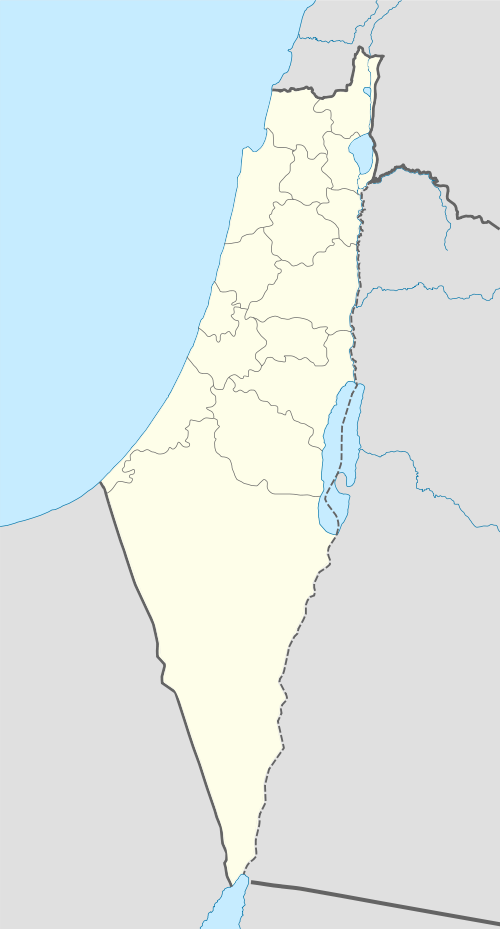Zochrot
Zochrot (Hebrew: זוכרות; "Remembering"; Arabic: ذاكرات; "Memories") is an Israeli nonprofit organization founded in 2002. Based in Tel Aviv, its aim is to promote awareness of the Palestinian Nakba ("Catastrophe"), the 1948 Palestinian exodus.[1] The group's director is Eitan Bronstein. Its slogan is "To commemorate, witness, acknowledge, and repair".[2]
 | |
| Founded | 2002 |
|---|---|
| Founder | Eitan Bronstein |
| Location |
|
Revenue | 280,000 euros in 2006 |
| Website | Zochrot website in Hebrew; in English |
Zochrot organizes tours of Israeli towns, which include taking displaced Palestinians back to the areas they fled or were expelled from in 1948 and afterwards.[3] The group erects street signs giving the Palestinian history of the street or area they are in. Zochrot sees this as causing "disorder in space", raising questions about naming and belonging. A key aim is to "Hebrewise the Nakba" by creating a space for it in the public discourse of Israeli Jews.[1]
The word "Zochrot" uses the feminine plural present tense form of the Hebrew verb "to remember", whereas it is customary in Hebrew to use the masculine plural form when referring to a group of people. The feminine form was chosen to signal Zochrot's approach toward the Nakba, which the group says challenges what it sees as the masculine historical narrative by focusing on compassion and inclusion.[1]
Publications
The magazine of the group bears the name Sedek (English: rupture/rift) and was published for the fourth time in spring 2010. This issue contains more than 40 poems by Israeli poets, which were published in the period between 1948 and 1958. The poems reflect the views of the authors on the displacement of the Palestinians in the years around the foundation of Israel.
In 2012, Zochrot and Pardes Publications published a guidebook Omrim Yeshna Eretz ("Once Upon a Land – a Tour Guide") in Arabic and Hebrew, which is "designed to educate Jewish-Israelis about how their towns and cities were founded in an effort to reconcile them with the original inhabitants of the land".[4][5] It provides tours of 18 localities, mostly the sites of Palestinian villages depopulated in 1948.[4][5] While Zochrot translates the title "Omrim Yeshna Eretz" into English as "Once Upon a Land", a more literal translation would be "They Say There Is a Land". "Omrin Yeshna Eretz" is a popular song and Israeli folk dance[6] based on a poem by Shaul Tchernichovsky first published in a 1929 collection.[7][8]
Funding
According to its 2010 annual report, Zochrot listed the following groups as contributors: EKS-EPER, Trócaire, CCFD, Broederlijk Delen, MISEREOR, ICCO-KerkinActie, Oxfam GM, Oxfam Solidarity, Mennonite Central Committee, Medico International.[9] The group did not list its annual income.[9] In its 2006 annual report, the group declared a total income of 280,000 euros and listed the Mennonite Central Committee, Kerkinactie, ICCO, Cimade, CCFD, EPER/HEKS, Broederlijk Delen, Oxfam Solidarity Belgium, Misereor, Medico International, and Zivik as contributors.[10]
In 2012, the German Holocaust remembrance foundation EVZ announced that they would no longer support Zochrot due to Zochrot's support for the Palestinian right of return.[11]
Notes
- Bronstein, Eitan. "The Nakba in Hebrew: Israeli-Jewish Awareness of the Palestinian Catastrophe and Internal Refugees", in Masalha, Nur. (ed.) Catastrophe Remembered: Palestine, Israel and the Internal Refugees. Zed Books, 2005.
- Zochrot, the website in English, accessed 9 February 2010.
- Rinat, Zafrir (13 June 2007). "Out of sight maybe, but not out of mind". Haaretz.
- "Whose land is it anyway?". The Economist. 15 April 2013.
- Moshe Gilad (7 December 2012). "The Arab villages that were; a new Israeli guidebook". Haaretz.
- "Omrim Yeshna Eretz - Amir Sela". Aura Levin Lipski.
- "שאול טשרניחובסקי (1875–1943)" [Shaul Tchernichovsky (1875–1943)] (in Hebrew). Project Ben-Yehuda.
- "Sounds Israeli – Omrim Yeshna Eretz (They say there is a land)". UK Media Watch.
- 2010 Annual Report p.40
- Annual report 2006, Zochrot, accessed 9 February 2010.
- Toby Axelrod (2 February 2012). "German fund pulls NGO cash". The Jewish Chronicle. London.
External links
- Official website in Hebrew, Arabic, and English
